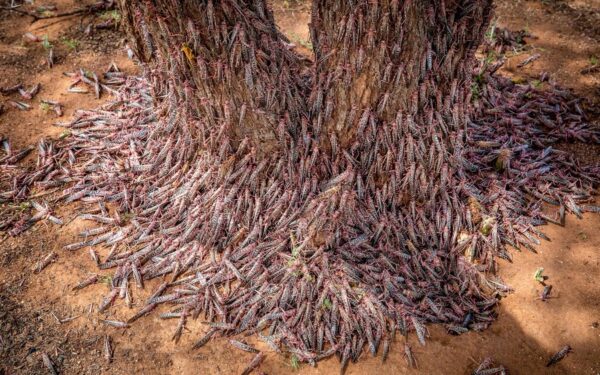PBS: Escaping Eritrea … [Read More...] about ካብ ውሽጢ ቤት ማእሰርታት ኤርትራ
A different plague: Africa battles next big wave of locusts
In a time of coronavirus quarantine, delays in the transportation of pesticides have been detrimental to East African countries who are fighting the largest locust invasion in 70 years.

Rodney Muhumuza – Kampala, Uganda |April 10, 2020 | Christian Science Monitor
Weeks before the coronavirus spread through much of the world, parts of Africa were already threatened by another kind of plague, the biggest locust outbreak some countries had seen in 70 years.
Now the second wave of the voracious insects, some 20 times the size of the first, is arriving. Billions of the young desert locusts are winging in from breeding grounds in Somalia in search of fresh vegetation springing up with seasonal rains.
Millions of already vulnerable people are at risk. And as they gather to try to combat the locusts, often in vain, they risk spreading the coronavirus – a topic that comes a distant second for many in rural areas.
It is the locusts that “everyone is talking about,” said Yoweri Aboket, a farmer in Uganda. “Once they land in your garden they do total destruction. Some people will even tell you that the locusts are more destructive than the coronavirus. There are even some who don’t believe that the virus will reach here.”
Some farmers in Mr. Abokat’s village near the Kenyan border bang metal pans, whistle, or throw stones to try to drive the locusts away. But mostly they watch in frustration, largely barred by a coronavirus lockdown from gathering outside their homes.
A failed garden of cassava, a local staple, means hunger. Such worries in the village of some 600 people are reflected across a large part of East Africa, including Kenya, Ethiopia, and South Sudan. The locust swarms have also been sighted in Djibouti, Eritrea, Tanzania, and Congo.
The U.N. Food and Agriculture Organization has called the locust outbreak, caused in part by climate change, “an unprecedented threat” to food security and livelihoods. Its officials have estimated this new wave to be 20 times the size of the first.
“The current situation in East Africa remains extremely alarming as … an increasing number of new swarms are forming in Kenya, southern Ethiopia, and Somalia,” a new FAO assessment said.
Favorable breeding conditions through May mean there will likely be another new round of swarms in late June and July, coinciding with the start of the harvest season, the agency said.
The U.N. has raised its aid appeal from $76 million to $153 million, saying immediate action is needed before more rainfall fuels further growth in locust numbers. So far the FAO has collected $111 million in cash or pledges.
The locusts are “invading the Eastern Africa region in exceptionally large swarms like never seen before,” the Nairobi-based Climate Prediction and Application Center said.
The new swarms include “young adults,” voracious bugs “that eat more than the adult ones,” said Kenneth Mwangi, a satellite information analyst at the center.
Mr. Mwangi and other officials in Kenya cited difficulties in fighting the infestation as coronavirus-related travel restrictions slow cross-border travel and delay the delivery of pesticides.
The verification work of field officers has been curtailed, making it harder for the center to update regional prediction models, Mr. Mwangi said.
In rural Laikipia county, among the worst affected in Kenya, some are calling attention to the threat to commercial farms.
“I think, unfortunately, because of other things going on around the world, people are forgetting about the problem with the locusts. But it’s a very, very real problem,” farmer George Dodds told the FAO.
Aerial spraying is the only effective way to control the locust outbreak. After the locusts crossed into Uganda for the first time since the 1960s, soldiers resorted to using hand-held spray pumps because of difficulties in obtaining the needed aircraft.
Uganda’s agriculture minister said authorities are unable to import enough pesticides from Japan, citing disruptions to international cargo shipments.
The government is yet to meet an additional budget of over $4 million requested for locust control, the minister said.
The sum is substantial in a country where the president has been fundraising from wealthy people to help respond to the virus and its economic disruption. Health workers are threatening to strike over lack of protective gear.
Other countries face similar challenges.
In Ethiopia, where some 6 million people live in areas affected by the locust outbreak, the infestation if unchecked “will cause large-scale crop, pasture, and forest-cover loss, worsening food and feed insecurity,” the FAO says.
Bands of immature locusts are forming in areas that include the country’s breadbasket like the Rift Valley region, it said.
Ethiopia’s agriculture minister has said efforts are underway to deploy six helicopters against the infestation that could last until late August.
But ministry spokesman Moges Hailu spoke of an ominous sign: The locust swarms are now appearing in locations where they had not been previously sighted.
This story was reported by The Associated Press.
